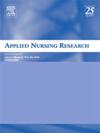护士和助产士富有同情心的自我护理:一项顺序解释混合方法研究
IF 2.7
4区 医学
Q1 NURSING
引用次数: 0
摘要
尽管越来越多的证据表明,高度的自我同情可以减少焦虑,提高幸福感,但对自己友善和富有同情心的意识往往被忽视。目的探讨对自己有同情心对护士和助产士意味着什么,并增加对自我同情如何提高幸福感的认识和理解。方法采用混合方法研究设计,调查和探讨自我同情对护士和助产士幸福感的影响。第一阶段涉及定量数据收集和分析。第二阶段收集定性数据以扩展定量结果。结果54名参与者参加了研讨会前问卷调查,55名参与者立即完成了问卷调查,28名参与者在6 - 8周后完成了随访问卷调查。五名参与者接受了采访,以进一步了解他们的经历。定量结果显示,工作坊结束后,自我同情得分显著提高,估计提高了0.26分(95% CI: 0.14, 0.38, P <;0.001)。参与者的焦虑显著降低了0.5个单位(95% CI: - 0.64, - 0.36, P <;0.001)。情绪变化无统计学意义。对定性数据的反身性专题分析进一步深入了解了这些变化,得出了三个关键主题:(1)“自我同情意识是第一步”,(2)“先关心自己,再关心他人”,(3)“日常生活活动中的自我同情策略”。结论自我同情教育能提高护士和助产士的自我同情知识和理解。教育可以增加自我同情的策略和技能,以减少焦虑水平。然而,定性数据证实了持续加强自我同情实践的必要性。建议进一步研究以证实这些初步发现并探讨长期影响。本文章由计算机程序翻译,如有差异,请以英文原文为准。
Compassionate self-care for nurses and midwives: A sequential explanatory mixed methods study
Background
Awareness of being kind and compassionate to yourself is often overlooked despite emerging evidence that high levels of self-compassion decrease levels of anxiety and improves well-being.
Aim
To explore what being compassionate to yourself means to nurses and midwives and increase knowledge and understanding of how self-compassion may enhance well-being.
Methods
Mixed methods study design was utilised to investigate and explore the influence of self-compassion on nurses and midwives' well-being. Phase 1 involved quantitative data collection and analysis. Phase 2 qualitative data were collected to expand on quantitative results.
Results
Fifty-four participants responded to a pre-workshop questionnaire, 55 completed immediate post-questionnaire, 28 completed a follow-up questionnaire six-eight weeks later. Five participants were interviewed to gain more insights of their experiences. Quantitative results showed significant increase in self-compassion scores immediately post-workshop, with an estimated improvement of 0.26 points (95 % CI: 0.14, 0.38, P < 0.001). Participants' anxiety significantly decreased by 0.5 units (95 % CI: −0.64, −0.36, P < 0.001). Mood changes were not statistically significant. Reflexive thematic analysis of qualitative data provided further insight into these changes resulting in three key themes: (1) “Awareness of self-compassion was the first step”, (2) “Care for yourself, before caring for others” (3) “Self-compassion strategies with everyday living activities”.
Conclusions
Self-compassion education can enhance nurses' and midwives' knowledge and understanding. Education can increase self-compassion strategies and skills to reduce anxiety levels. However, qualitative data confirmed the need for sustained reinforcement of self-compassion practices. Further research is recommended to confirm these initial findings and explore long-term impacts.
求助全文
通过发布文献求助,成功后即可免费获取论文全文。
去求助
来源期刊

Applied Nursing Research
医学-护理
CiteScore
4.50
自引率
0.00%
发文量
65
审稿时长
70 days
期刊介绍:
Applied Nursing Research presents original, peer-reviewed research findings clearly and directly for clinical applications in all nursing specialties. Regular features include "Ask the Experts," research briefs, clinical methods, book reviews, news and announcements, and an editorial section. Applied Nursing Research covers such areas as pain management, patient education, discharge planning, nursing diagnosis, job stress in nursing, nursing influence on length of hospital stay, and nurse/physician collaboration.
 求助内容:
求助内容: 应助结果提醒方式:
应助结果提醒方式:


